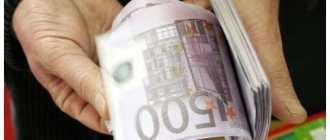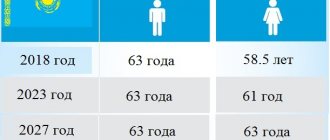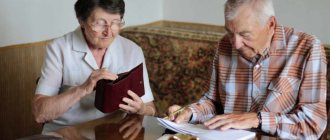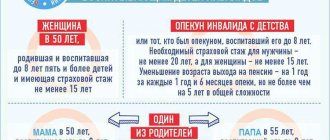Germany
People born before 1947 retire at age 65.
For people born in 1947-1958, one more month is added to the retirement age of 65 for each year. Those. Germans born in 1958 retire at 66.
For people born between 1959 and 1963, retirement age is determined by adding two more months to age 66 for each year.
Thus, the retirement age is gradually increasing. Everyone born since 1964 will only retire at age 67.
general information
The Alpine Republic received another title to its treasury. The Swiss pension system was included in the top 10 best pension systems in the world according to the latest Melbourne Mercer Global Pension Index-2017 study.
The Confederation took 8th place when a total of 30 countries among developed countries took part in the ranking.
All pension systems were assessed according to criteria such as proportionality, completeness and sustainability of development.
In addition to government guarantees, experts also assessed the role of private insurance.
USA
Under the US Social Security Act of 1935, the minimum age to receive full retirement benefits was 65. In 1983, amendments were adopted to raise the retirement age to 67 years.
Persons born between 1943 and 1954 are entitled to receive full pension benefits at age 66. For citizens born after 1954, 2 months are added to the retirement age for each year. Thus, persons born in 1955 will retire at 66 years and two months, and persons born in 1960 at 67 years.
Swiss pension for foreigners
Foreigners living in Switzerland can receive a pension if they have dual citizenship. The second country must belong to the European Union or have a pension agreement.
Russian citizens cannot receive a pension here or take into account their work experience in this country, because... there is no signed agreement. You can apply for Russian benefits if you have paid contributions to the Pension Fund. The registration is handled by the department working with the population living abroad. Payments are transferred in rubles to an account opened in a selected financial institution in Russia. Every year you need to confirm that you are not dead.
Czech
The retirement age depends on the year of birth, gender and number of children born (for women). For those born before 1936, the retirement age is 60 for men; for women it ranges from 53 (if she raised for at least five days) to 57 (without children).
For citizens born between 1936 and 1971, the retirement age increases annually by two months for men and by four months for women. For those born after 1971, the retirement age is 65 years.
Swiss pension system
Nowadays, a three-tier pension system has been in effect in Switzerland since 1972. The basis is made up of supports or columns.
First pension level
The basic pension regime is established by the state (ANV) - it provides minimum payments for old age, loss of a breadwinner or disability. Based on contributions paid by the citizen - 5.12%, and the employer - the same amount.
The entire population pays them:
- unemployed - 425 francs per year;
- employed pensioners if they have incomes over 1400;
- seasonal and non-permanent employment—according to a specific scheme;
- self-employed - 9.5%.
Important information from BBQcash: capital investments are tax-free.
Contributions are made throughout life from 18 to 65 years of age. The amount of benefits at this level depends on salary and period of work. From 2019 it is equal to 1185-2370 francs. The highest amount is paid if:
- men worked 45 years, women - 44;
- the annual income was no less than 84.6 thousand francs.
To receive benefits at this level, you must pay contributions for at least 12 months.
In 2020, it was proposed to increase payments from the state by 10%. This is a rather controversial proposal - the population voted against it in the referendum.
Second pension level
This support has been in effect since 1985 - compulsory insurance of a person for the period of working activity, and is a funded (BVG) part of the pension. The goal is that the benefit amount should be at least 60% of the salary. Transfer 7-18% of income to savings banks chosen by the employer.
Interesting information from BBQcash: When changing jobs, a person transfers his savings independently.
All citizens are required to pay contributions if:
- over 17 years old;
- annual income is more than 21.3 thousand francs.
Self-employed people, people earning less than the required amount, individual entrepreneurs are not required to pay, only if they wish. For them there is the following - 3 support.
Important from BBQcash: a citizen in old age receives 6.8% from his savings.
This level is added to the previous one, significantly increasing the benefit amount. A person can receive all the savings in full if:
- buys a home;
- creates a business;
- pays off the mortgage;
- moves for permanent residence abroad;
- receives disability benefits.
In 2020, there were changes related to the savings of spouses - after a divorce, they are divided in half.
Third pension level
Voluntary level or self-insurance - the principle of operation is similar to other countries. There are two types:
- Target - formed from tax deductions. Contributions can reduce the current base - by a maximum of 34.1 thousand francs for individual entrepreneurs, for others - 6.8.
- Free - voluntary payments to private funds, banks or insurance companies.
No tax is paid on interest received.
Useful information from BBQcash: transition to official work for the self-employed - it is possible to transfer savings to the previous level.
You can use your savings after reaching a certain age. There are many investment products offered with favorable conditions. Responsibility for funds lies with the foundations, not the state. They are known throughout the world for their reliability. The amount paid depends on the amount of savings.
Obtaining a visa
In any case, no matter what the path to finding a job turns out to be, to cross the Austrian border you will need a visa of the appropriate type. To begin with, you should understand that, according to local legislation, a company that intends to hire a citizen of another state must obtain permission to carry out this activity.
The process of obtaining a work permit in Austria looks like this:
- The employer opens a vacancy.
- Submits an application to the local so-called employment center.
- After this, the search for an employee among local residents begins.
- If a suitable candidate is not found, the ministry issues a work permit for the foreigner.
If the applicant applies to the consulate for a visa to look for work, then after the job search is successful, he does not need to return home to open a work visa and enter the country as a foreign worker. The validity of the stamp that will be given to him upon entry is simply extended for another 12 months. Further stay in Austria is carried out on the basis of a residence permit for work reasons (EU Blue Card or Red-White-Red Card).
Accrual of points
The Austrian authorities are quite loyal to hired labor coming from abroad, but only if the candidates have the appropriate education and qualifications.
Based on this assessment, the selection of applicants is greatly simplified, which makes it possible to weed out those who do not meet the requirements and interests of the state, and to simplify the employment of those who are professionally beneficial.
To get a visa stamp, you need to score 70 points. In some cases, exceptions are possible. Most often they concern representatives of rare professions, for example, medical workers and engineering and technological specialists. If the applicant belongs to one of these specializations, then it is enough for him to score only 50 points.
A special commission awards points. Each criterion meets a certain number of them.
When considering an application, the following parameters are taken into account:
- applicant's age;
- speciality;
- experience;
- qualification;
- level of foreign language proficiency.
It should be noted right away that working in Austria without knowledge of the language is practically unavailable. So how are points awarded? For a certain length of service, you can immediately receive 10-20 bonuses. Representatives of foreign countries under 35 years of age also receive 20 points. Those who have already crossed this line can only count on 10.
Having a higher education and a specialty in short supply gives you a chance to get another 20 points to your total. For each year worked in your specialty, you can additionally receive two more points. But if the experience has already been accumulated on Austrian territory, then every six months is assessed at 10 units. Holders of a scientific degree receive another 40 points, and patents and distinctions add an additional 20 to this amount.
If the score has reached the required level, the candidate receives a visa stamp for 6 months and goes in search of an employer. If one already exists, the applicant immediately receives 50 points and, based on the permission received by the employer, travels abroad.
Otherwise, the consulate simply refuses the visa. This is due to the fact that salaries and prices in Austria are quite high, and therefore they simply do not need migrants who cannot provide themselves with a decent living.
Extension of visa stamp
The sticker that is affixed to the foreign worker’s passport has, as already mentioned, a limited validity period of 6 months. This visa cannot be extended; it only allows the immigrant to look for work. If the search is successful, you will need to apply for a specific work permit - a blue or red-white-red card. Both documents are issued, as a rule, for 12 months.
The further fate of the work permit is determined after the expiration of these 12 months by the employment contract. If it is extended, you can obtain a visa for the entire period of its duration. After the required number of years has passed, you can already count on a temporary residence permit. If the contract is not renewed, the foreign employee will have to leave the country.
Swiss life expectancy
The average life expectancy for men in Switzerland is 79 years, for women - 84 years.
These indicators are directly related to the well-being of life in the country:
- Medical service. The Swiss are very attentive to their health. Having noticed even minor violations, they immediately go to clinics, where they undergo emergency diagnostics and the necessary therapy. Despite the fact that medicine in the country is very expensive, all residents have the opportunity to be treated for many diseases and receive surgical care under a medical insurance policy. All expenses are reimbursed by insurance companies.
- Lifestyle. Switzerland has a favorable environment. Residents of the country visit various resorts and travel around the world more often than others. This has a positive effect on well-being and adds several more years to life expectancy.
Comparison of life expectancy in Switzerland and other countries of the world
Despite the fact that Switzerland is a very expensive country, local residents feel secure in it.
Housing cost
If a Russian citizen wants to purchase real estate in Austria, he must first obtain a special permit for the purchase at the address of registration of the future building or apartment. Usually this is not difficult to do, the document is prepared quickly, subject to all the requirements of local authorities and the submission of the necessary papers.
For Russians who want to emigrate, get a job or study, it is of interest how much an apartment costs in Austria. The rental price depends on the location, but even in Vienna you can find affordable housing if the house is state-owned. Usually these are small premises, but with an acceptable rental price.
When signing the contract, you should remember the additional costs equivalent to 2 months’ payment. The money is placed on a non-refundable deposit. Long-term rental of a one-bedroom apartment varies between 500-650 euros per month, in the capital - from 550 to 750. Compared to Russia, utility tariffs in the republic are high. Water is often included in the rent, and prices for electricity and gas range from 150 to 200 euros per month for a 100 sq. m dwelling. m.
Features of medical care
There are no over-the-counter medications in Austrian pharmacies. Health insurance does not fully cover the therapeutic process. The amount you have to pay extra yourself depends on the diagnosis and stage of the disease.
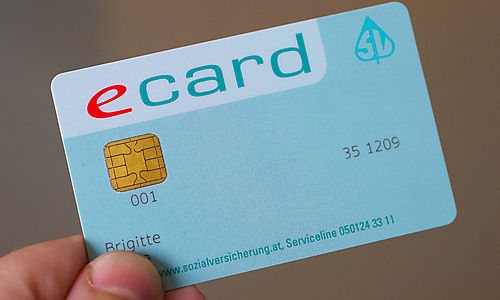
The amount for persons with chronic pathologies increases.
Every citizen of the country has “their own” doctor. He diagnoses and prescribes treatment. If necessary, the doctor refers the patient to a specialist.
Pensioners are entitled to benefits. Medicines are dispensed free of charge, but a duty of 3 euros is paid for each package.
Return to contents
Results
| Advantages | Flaws |
| social security; | high prices for housing and utilities; |
| high salaries; | strict requirements for migrants; |
| the opportunity to build a career with a profession in demand; | the need to study the state language already at the stage of preparation for migration; |
| low unemployment; | high taxes; |
| good ecology; | large number of migrants |
| life safety; | |
| quality food products; | |
| beautiful mountain scenery and proximity to ski resorts; | |
| quality medicine; | |
| accessibility of education; | |
| possibility of free movement in other European countries |
Life in Austria
The current figures for Austria are as follows:
- The average annual income for 1 family is 30.0 thousand euros.
- The number of people employed in prestigious jobs is 75%.
- The number of people working overtime is 7%.
- Average life expectancy is 81 years. Many live up to 95 years.
- Quality of life assessment – 7.5 points/10.
Austria has the lowest unemployment rate. Austrian employers prefer to employ their fellow citizens first of all. Highly qualified foreigners with a narrow specialization are also regularly attracted.
Read about work and available vacancies in Austria by following the link.
Return to contents
Food expenses
Food prices in Austria are low. Even workers who work in the lowest paid jobs receive at least 1,000 euros. In provincial cities, about 250 euros per person are spent on food; life in the capital is somewhat more expensive. A trip to a fast food establishment will cost 7-9 euros. A visit to a restaurant with lunch for two will cost 45-50 euros.
On the Internet, on forums, you can find useful tips for immigrants from compatriots on how to save money. If you cook and eat at home, you can minimize costs. To do this, you should make purchases in budget stores of the Penny Markt and Soma chains, where food prices fluctuate between 1-2 euros.
Benefits for pensioners
The average level of pension provided is so high that the question of providing benefits for anything automatically disappears.
Benefits for pensioners in Switzerland are not provided even for transport or utility bills.
All expenses regarding travel, flights, medicine, etc. are subject to 100% payment for both the working class and pensioners.

